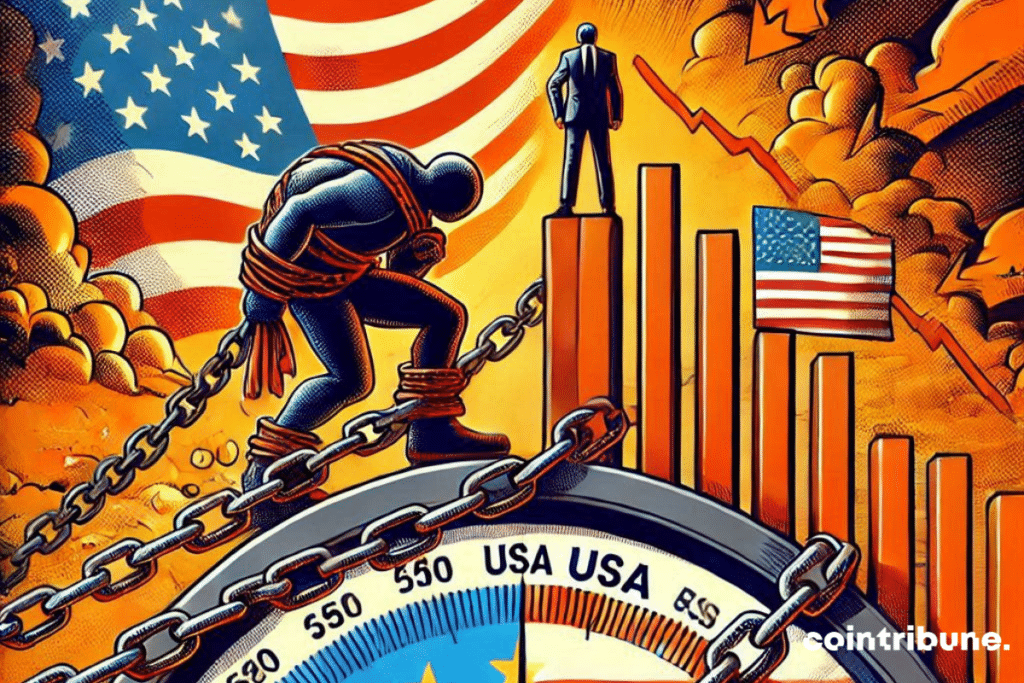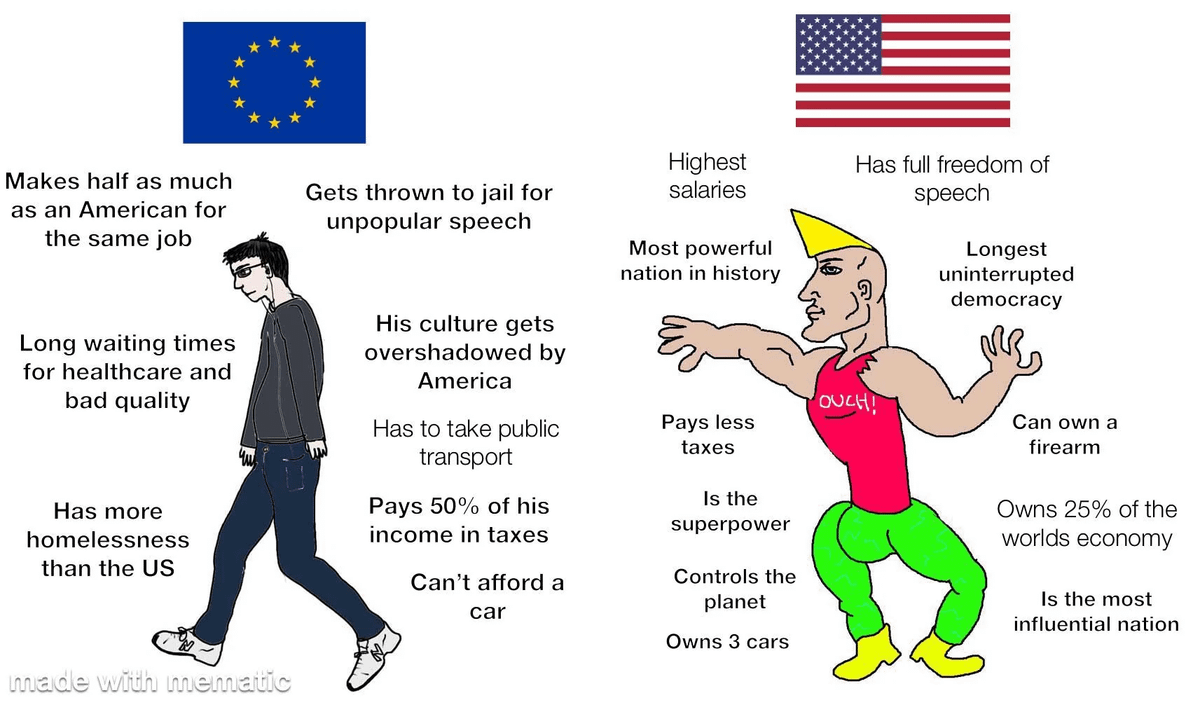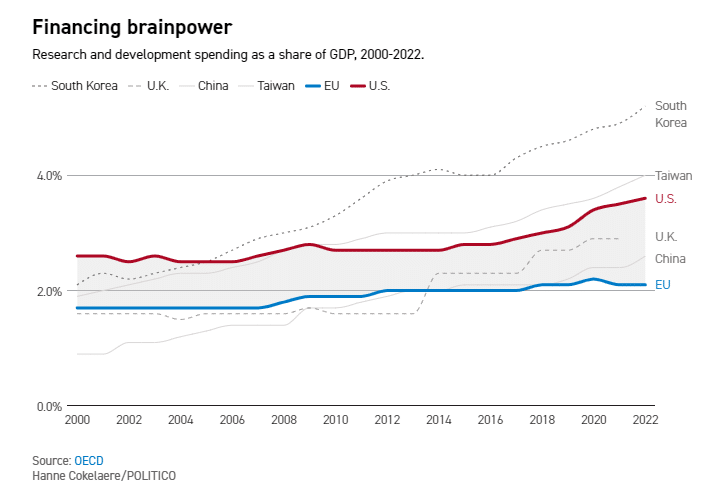Even French president Emmanuel Macron admits it.
— Ole Lehmann (@itsolelehmann) January 13, 2025
When comparing Europe to the American and Chinese markets, he said: pic.twitter.com/1QWKRapf5a
A
A
Europe on Its Knees: The American Economy Surpasses the Old Continent by 50%
Wed 15 Jan 2025 ▪
6
min read ▪ by
Getting informed
▪
Summarize this article with:
The European economy is in full turmoil. Once a global powerhouse, the Old Continent seems mired in a system incapable of competing with its American and Chinese counterparts. While the GDP of the United States soars, that of Europe stagnates. The numbers are compelling, but how did we get here? Between brain drain, bureaucratic heavy-handedness, and a lack of innovation, Europe seems to have missed the turn of the 21st century. Let’s decipher the causes of this decline.

The European economy, hindered by its bureaucracy
Europe, the champion of regulation — notably with MiCA, has become its own enemy. Where the United States prioritize innovation and boldness, Europe bogs down in an oppressive bureaucratic model. To create a business in France, one must wait 84 days, compared to just 4 in the United States. This disparity significantly hampers competitiveness.
This obsession with rules only burdens an already gloomy economic climate. Emmanuel Macron himself admitted that “the old European model is outdated”.
Too much regulation, not enough flexibility: this is the recipe for decline. Meanwhile, the United States is racing ahead, creating companies valued at over a trillion (1,000 billion) dollars.
Moreover, the attitude towards entrepreneurs doesn’t help. In Europe, business creators are often viewed as “exploiters”, which starkly contrasts with the American culture where entrepreneurial failure is seen as a stepping stone to success. This mentality contributes to the brain drain, with Europeans preferring to try their luck across the Atlantic.

As a result, investments in innovation remain desperately low: 2.8% of GDP in Europe compared to 5% in the United States. If this trend continues, the economic gap will only widen.
EU vs USA: An expanding economic gap
The figures reflect a growing gap between the American and European economies. In 2008, the two GDPs were comparable. Today, the one from the United States is 50% higher. But this gap goes beyond statistics: it reveals diametrically opposed strategies.
The United States bets on innovation, with massive investments in new technologies. Companies like Google, Amazon, or Apple epitomize this success. Meanwhile, Europe is content to import American or Chinese innovations, unable to produce its own tech giants.
In terms of productivity, the tally is equally disastrous. Between 2010 and 2023, American productivity surged by 22%, while that of Europe stagnated at 5%. The reasons are manifold: lack of investment in artificial intelligence, low spending on research and development, and outdated technological infrastructures.

Several key elements underline this gap:
- GDP invested in technologies: 5% in the USA compared to 2.8% in Europe;
- Number of startups valued at over $1 trillion: 9 in the USA, 0 in Europe;
- Salary of tech talents: Up to 50% lower in Europe.
These disparities explain why young talents and entrepreneurs are leaving Europe en masse, favoring more promising destinations like the United States or Southeast Asia.
Crypto and technologies: A European sovereignty in danger
In the cryptocurrency sector, Europe is also lagging significantly. While the United States innovate and attract crypto companies, the European Union gets lost in ethical debates and stifling regulations.
Examples abound. Coinbase, one of the largest crypto platforms, thrives in the United States while Europe struggles to establish a conducive framework. The result: some European talents turn to America, where the potential for innovation is much better harnessed.
This delay extends beyond cryptocurrencies. Artificial intelligence, blockchain, and disruptive technologies remain dominated by the United States and China. Europe, for its part, seems trapped in a follower role, dependent on foreign infrastructures.
To correct this trajectory, Europe must urgently:
- Reduce regulations to encourage innovation;
- Invest massively in research and development;
- Offer tax incentives for tech companies;
- Support local startups by simplifying administrative procedures.
Without a swift turn, Europe’s delay in emerging technologies risks becoming irreversible, threatening its digital and economic sovereignty.
As a finishing touch, the war in Ukraine exacerbates Europe’s difficulties. With the decision of Kiev to cut Russian gas, amid conflict with Vladimir Putin, the economic outlook of the Old Continent darkens further. This strategic choice, while understandable, risks delivering a fatal blow to an already faltering economy. The coming months are crucial for Europe, which must overcome these challenges to hope to turn things around.
Maximize your Cointribune experience with our "Read to Earn" program! For every article you read, earn points and access exclusive rewards. Sign up now and start earning benefits.
A
A
La révolution blockchain et crypto est en marche ! Et le jour où les impacts se feront ressentir sur l’économie la plus vulnérable de ce Monde, contre toute espérance, je dirai que j’y étais pour quelque chose
DISCLAIMER
The views, thoughts, and opinions expressed in this article belong solely to the author, and should not be taken as investment advice. Do your own research before taking any investment decisions.